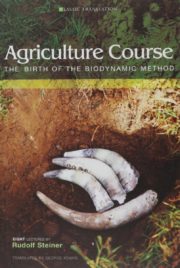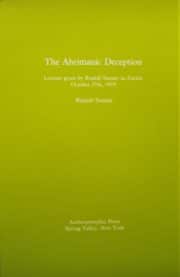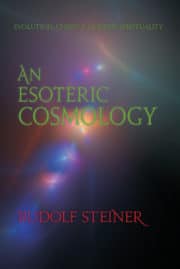Fundamentals of Biochemistry in the Light of Spiritual Science
Knowledge still arises today from two sources, namely experience and insight. These are ultimately based on perception and thinking. However, the relation between the two changes with time. Whereas in previous centuries insight was valued over experience, today the pendulum has swung in the other direction. Now, only what is secured experimentally through sense perception is considered to be proven, while knowledge based on insights is doubted and felt to be unreal.
Reductionism is contrary to the method of reading from the book of nature, an approach elaborated by Goethe, the founder of a natural science that is in accordance with the spirit. It cannot be the purpose of an investigation or explanation only to follow the sequence of letters in a book without encountering what the words mean. The sequence of words should be looked upon as an expression of a superordinate content of thought, an idea, or a being. In the future one should be able to read in the Book of Nature and understand it, not analyze it.
This book is an attempt to read in the field of biochemistry in this manner:
“Only if we can penetrate down to the concrete details of material processes in the divine creation can we penetrate spirituality with science and lead science back to spirituality. Likewise, it is necessary to follow the divine activity of creation right down to the outermost limits of the material.” -Rudolf Steiner 1922
C O N T E N T S:
Preface
Forward to the 2nd Edition
Forward to the English Edition
INTRODUCTION
- The Formulation of the Problem
- Life, Substance, Matter
- Life Carriers
- Life and Light
- Hydrogen
- Oxygen
- Water
- Carbon
- Nitrogen
- The Elements of Life
- Combustibility
- Acids and Bases
- Polarities
- Salt Formation
CARBOHYDRATES
- The Writing of Formulas
- Concerning the Essence of Numbers
- Sugar and the I-Organization
- Galactose
- Fructose
- Reducing the Capacity of the Sugars
- Disaccharides
- Starch and Cellulose
- Mucopolysaccharides
- Carbohydrate Metabolism
- The Citric Acid Cycle
- Formic Acid
- Carcinoma
- Glycolysis
- Pentoses
FATS
- The Middle Position of Fats
- Fatty Acids
- Fatty Acid Breakdown
- Double Bonds
- Omega-three and -six Fatty Acids
- Cis- and trans- Configuration
- Fat HArdening
- Fat Quality
- Prostaglandins
- Fat Metabolism
- Oil Formation in Plants
- Lipoids
- Phosphates
- Cephalins
- Glycolipids
- Sphingolipids
- Steroids
- Cholesterol
- Cholesterol Degradation
PROTEINS
- The Role of Proteins
- Amino Acids
- Protein Synthesis and Rhythm
- Protein Breakdown
- Enzymes
- Crystals and Life
- Urea
- Amino Acid Breakdown
- The Aromatic Ring Formation
- Colorfulness
- Aniline
- The Aromatic Amino Acids
- Synthesis of Biogenic Amines
- Folic Acid
- Nucleic Acids
- Uric Acid
MINERAL METABOLISM
- Metals and Non-metals
- The Alkali Metals
- Potassium
- Sodium
- Lithium
- The Alkaline Earth Metals
- Magnesium
- Calcium
- Halogens
- Iodine
- Bromine
- Chlorine
- Fluorine
- Silicon 359
- Phosphorus and Sulfur
- The Periodic Table of the Elements
Methodology
Bibliography
Additional Bibliography of English Translations
About the Author
Index
About the Author
Dr. Otto Wolff was born in 1921 in Glatz, Silesia (at the time, a region in northeast Germany). He studied biochemistry and medicine and first worked as a hospital physician, then as a general physician and school doctor. Later he worked many years in the pharmaceutical industry to develop new anthroposophic medicines. He wrote numerous publications on anthroposophic medicine, including the standard work: The Anthroposophic Approach to Medicine (three volumes). During his last twenty-five years, Dr. Wolff taught anthroposophic medicine to medical doctors worldwide. He died in Arlesheim, Switzerland, in 2003.













Sarah R. (verified owner) –
Great service!